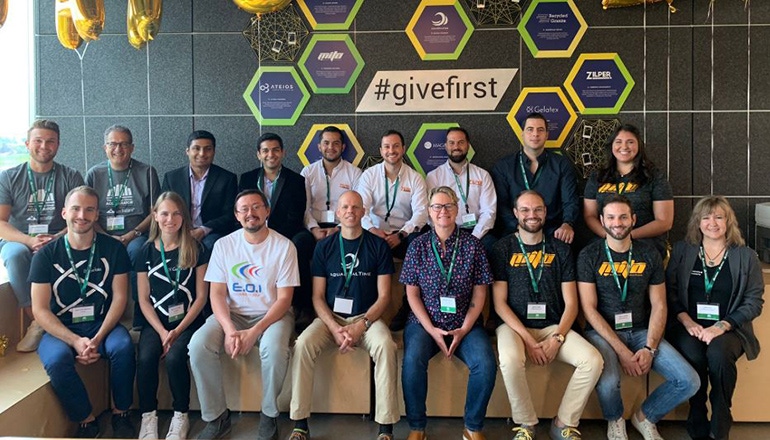The Heritage Group Accelerator, a three-month intensive program of research and development, mentorship and collaboration, will scale 10 startups.

A recently launched accelerator based in Indianapolis includes environmental services companies that aim to reinvent the waste and recycling industry.
The Heritage Group (THG) and Techstars launched The Heritage Group Accelerator Powered by Techstars, a three-month intensive program of research and development, mentorship and collaboration that will scale 10 startups.
“These 10 companies are moving to Indianapolis for the program to work with our companies and the global Techstars network to take significant leaps forward in their business progress,” says Jon Schalliol, director of the New Ventures Group at THG. “The program is mentor led, and we bring dozens of expert mentors from industry, the national startup community and the local entrepreneurial ecosystem to meet with each founding team. The attitude of #GiveFirst, which Techstars coined, really is at play for our mentors, and these excellent mentors provide advice and connections simply because they want to see the companies succeed.”
THG received applications from 24 countries and many U.S. states for the program. The startups were considered based on their fit with THG companies and the strength of their technology and business proposition.
“It’s important to us that we are able to really help the companies progress, so we assembled a cross-functional group across our businesses and research group that would take a deep look into what the company is doing as part of selection,” says Schalliol.
The goal was to pick the best startups that fit with skill sets from across THG and help the founders rapidly advance their businesses.
“We were looking for a way to source the best startups around the world to bring to Indianapolis, where we could expose our existing companies to new ideas and invest in the success of those startups,” says Schalliol. “There is no better organization to partner with than Techstars to achieve that goal, and we were thrilled we would have the opportunity to engage the fast-growing Indiana entrepreneurial ecosystem with the network.”
The accelerator will run through December 4, when the program will culminate in a Demo Day event. The 10 companies chosen represent a diverse array of technologies, spanning advanced materials, construction, infrastructure, sensors and environmental services.
“These companies have figured out better ways of operating than the status quo, and if they are successful, they will improve efficiency, environmental sustainability and create other positive changes that will have lasting impact,” says Schalliol.
Three of the companies in the accelerator are waste and recycling focused.
Boston-based Alkemy Environmental has developed technology that recycles waste into cost-effective, structural-grade and eco-friendly aggregates for the concrete industry.
“Our technology has many synergies with several of the industry sectors that The Heritage Group is a leader in. The accelerator enables us to work closely with the Heritage team both from a technical and business perspective, in order to advance the application of our technology in the market,” says Peter Kombouras, CEO and co-founder of Alkemy.
The company’s synthetic aggregate product offers the same performance as mined minerals used today, costs less and is 100 percent environmentally sustainable, according to Kombouras.
“Alkemy's recycling technology will eliminate the landfilling of industrial waste streams and the mining of finite natural resources for the building materials market, by producing high-strength, low-cost and green building materials entirely from waste,” he says.
Recycled Granite, based in Schererville, Ind., manufactures quartz countertops, pervious pavers, soil mineralizers and terrazzo from recycled aggregates/fines. With 17 franchised business model locations across the U.S., the company is researching future applications for the construction industry.
“I discovered Heritage Environmental while exhibiting at the Indiana Recycling Coalition Conference many years ago. I loved their sustainability mission and started following them on Facebook. The Techstars partnership came up on their feed and I had to apply,” says Julie Rizzo, CEO of Recycled Granite. “My reason for applying is that I'm literally buried in stone. I've created several new products and need a financial investment to scale the business in order to deal with this abundant waste stream.”
To date, the Recycled Granite network has recycled more than 100 million pounds of stone.
“There is not a single reason in the world why we should send these stone cut-offs to landfills,” says Rizzo. “There is a use for every single piece of silica. Techstars will help me identify growth opportunities that I could never do on my own … I'm honored to be a part of the Techstars program specifically because of the Heritage Group partnership. The state of Indiana is a hidden gem with some of the best global and sustainable ideas that change our future.”
Internationally, Tallinn, Estonia-based Gelatex Technologies produces a textile that is non-toxic, scalable and chemically identical to leather. The company was founded three years ago with a focus on eco-materials.
“I used to be a garment technologist, but seeing how polluting the fashion industry is, I got more and more frustrated about it and felt I would like to change that,” says Mari-Ann Meigo Fonseca, CEO and co-founder of Gelatex Technologies. “In spring 2016, I met materials scientists in the same university who worked on gelatin-based materials, and we realized that we could make a material that is chemically identical to leather but made from low value waste material, comes in rolls and production can be fast and easily scalable.”
Fonseca says the company applied for the accelerator because it can take up to a year to finish Gelatex’s leather-like textile, so she was seeking applications where the material could be utilized now.
“We want to make the everyday life of people greener and healthier, therefore we already have ideas about other applications where our gelatin-based nanofibrous material could be used,” she says. “The main focus now is still to make an easily scalable, eco-friendly, leather-like textile, but we also see potential to make a change in air filtration and medicine with our material.”
About the Author(s)
You May Also Like


